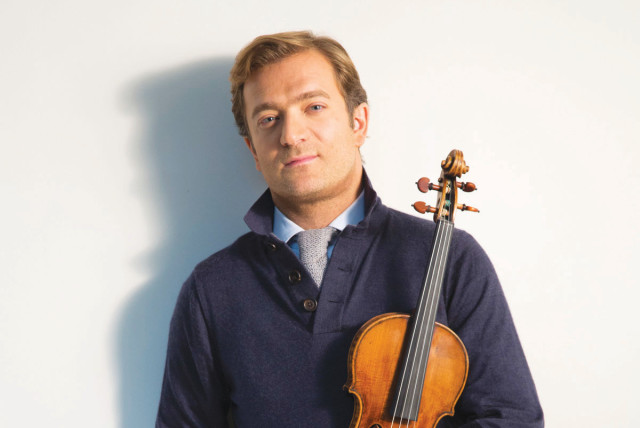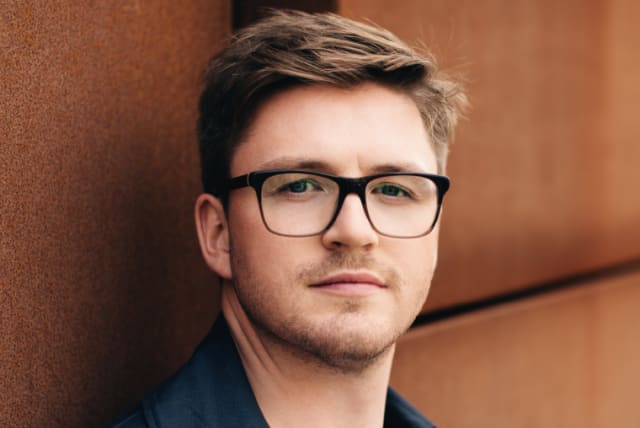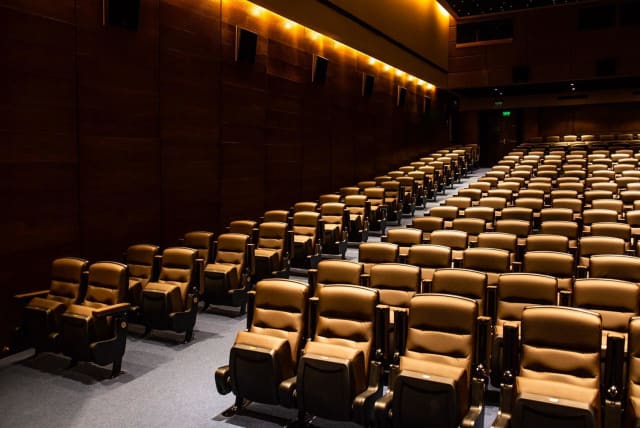It can help performing artists to know their audience. If that is the case, then Samuel Hasselhorn will have his work cut out for him when he debuts at the Jerusalem International Chamber Music Festival in just over a week’s time.
In fact, however, the 33-year-old baritone vocalist from Germany has already been there and done that in a burgeoning career which appears to be set for the higher planes of success.
Hasselhorn’s participation in the festival, which takes place for the 24th time at the YMCA September 5-9, is actually, strictly speaking, a matter of default.
“Elena Bashkirova originally invited me to a festival in Berlin,” he explains. That didn’t materialize, for various logistical reasons, but things worked out just fine for Hasselhorn in the end. “Elena asked me if I could come to Jerusalem to perform in this festival. I was more excited about that than Berlin,” he says, laughing.
Bashkirova founded the festival in 1998 – a couple of editions were lost to the pandemic – and has served as artistic director ever since. Each year, the program includes a focus on some pertinent topic or other.

This year’s theme is migrant composers, which, it must be said, offered Bashkirova – a celebrated pianist – plenty of room for programmatic maneuver. Such composer pantheon members as Mahler, Bartók, Stravinsky, Schoenberg, Rachmaninoff, and Korngold relocated in order to further their careers or for basic survival as they fled Nazi persecution.
Some didn’t survive. Viktor Ullmann, for example, hailed from the Silesia region of Austria, on the then border with Poland. He gained international recognition before being deported by the Nazis to the Theresienstadt concentration camp in 1942, despite growing up as a Catholic. Two years later he was transferred to Auschwitz, where he was gassed.
During his incarceration at Theresienstadt, like many of his fellow artists, notwithstanding the appalling living conditions, he maintained a highly active creative life. One of his best-known works from that period is chamber opera The Emperor of Atlantis, which is now performed around the world on a regular basis.
Hasselhorn has participated in a production of the Ullmann opera and says he is delighted to have the opportunity to sing some of the composer’s lieder (art songs) in one of his three concerts in Jerusalem.
“The first time I got in touch with Ullmann’s music was in 2017, when I sang in The Emperor of Atlantis at the opera house in Lyons. I loved the piece. I didn’t really know it before.” The baritone was duly hooked. “I loved the work and the production. After that, whenever I heard about someone producing a work by Ullmann, or recording something, I was interested. I started listening to more of his music.”
The German singer has gained a reputation for his crisp emotive readings of oratorio, opera, and lieder, and says he is looking forward to singing songs by Ullmann here. “This will be the first time I will perform lieder by Ullmann. Elena told me something about the [migratory] topic she had in mind for the festival, and it was very clear that Viktor Ullmann should be a composer that would be performed [in Jerusalem].”
It is impossible to sidestep the issue of the Holocaust, particularly considering the players involved in the forthcoming event. “It is important to keep Ullmann’s music alive. Also as a German coming to Jerusalem, with this whole topic behind this and the history. This is quite a unique thing for me to do. It is a special occasion,” he says.
For his initial appearance at the YMCA, Hasselhorn will take on Ullmann’s Der Mensch und sein Tag song cycle, with Jerusalem-born US-resident pianist Benjamin Hochman providing the instrumental underpinning.
Still, Hasselhorn is a professional, and his principal aim is to do as good a job as possible on the day. “Music is international. It doesn’t really matter where it comes from. It could be Russian, American, European, African, wherever. But, of course, the background behind it [Ullmann’s music] is very interesting. We have to keep the music alive. He was taken away too early, and who knows what he would have composed if he hadn’t died so early?”
Hasselhorn’s professional trajectory brought him close to Bashkirova on a previous occasion.
“About three years ago I sang in [Mozart’s] The Marriage of Figaro at the Staatsoper [State Opera] in Berlin when Daniel Barenboim was conducting,” he notes. Barenboim is not only a lauded pianist and conductor, he is also Bashkirova’s husband. “Elena came to Berlin and saw me in that, and then she saw me in a recital in Berlin.” The young vocalist had clearly left a favorable impression. “That is how the connection [with Bashkirova] started,” Hasselhorn says.
The two will finally take the stage together, on September 8, when Bashkirova provides the keyboard accompaniment for a selection of the Biblical Songs 10-piece series by Dvorak. In keeping with the migratory theme, Dvorak wrote the songs during a prolonged sojourn in New York.
In titular terms, at the very least, the song cycle sounds ideal for a festival located in this part of the world. “Even if you don’t know the songs, when you hear the word ‘biblical,’ even if you don’t know the music or the texts, you know it is somehow suitable for Jerusalem,” Hasselhorn muses.
Since he first sprang to frontline notice, after taking first prize in the 2018 Queen Elisabeth Competition in Belgium, Hasselhorn has spread his considerable gifts across a surprisingly broad repertoire. He has paid his operatic dues as a member of the Vienna State Opera ensemble; and in addition to the Barenboim date in Berlin, he has performed at Milan’s feted La Scala, the Opéra national de Paris and in Lisbon. He also regularly sings lieder and oratorio material.
He is not exactly going to sit around waiting for job offers, either. The current season work schedule sees him take on the title role in three new productions at the Staatstheater Nürnberg – in Mozart’s Don Giovanni; Debussy’s Pelléas et Mélisande; and Mathis der Maler by Hindemith.
Here, too, Hasselhorn’s career path wends into dark historical chapters. Mathis der Maler premiered in 1934, with Wilhelm Furtwängler conducting the Berlin Philharmonic. Despite eliciting an enthusiastic response from the audience, the work aroused the wrath of the Nazi authorities and was placed in the Entartete Musik (Degenerate Music) category. Not only did the Nazis consider the music too modern, but the composer’s wife had Jewish roots. Hindemith fled to Switzerland in 1938 after his music was banned in Germany.
Entertaining music by Schubert
For his third slot in Jerusalem, on the final day of the festival, Hasselhorn gets to entertain us with a selection of lieder put to music by Schubert, with Hochman once again behind the piano. The baritone has a particular soft spot for the Austrian classical composer, and says his oeuvre is a must for the festival.
“I think whenever you have chamber music and a chamber music festival, you have to do some Schubert. I have sung so many Schubert songs, and I will sing many more Schubert songs,” he says with a laugh. “It is always a joy to do Schubert.”
That, he explains, is largely down to the Austrian composer’s unfussy approach to his writing. “I think, in general, in life, the simplest things are the hardest to do. It is not easy to sing Schubert well.”
Schubert is generally considered to pertain to the classical era, but there are plenty of romantic inflections in his oeuvre, too. Still, Hasselhorn sets him aside from his younger counterparts who grew into the Romantic era. That, for the baritone, is Schubert’s charm. “If you compare him, for example, with Schumann, Schumann was way more romantic than Schubert. You can do so many things with Schumann’s music, especially as a singer. You can do so many things to make it your own.”
The classical composer requires a fundamentally different, more conservative, mindset. “With Schubert’s music, I don’t dare do too many crazy interpretations. I think there are so many rules and structural things you need to do and to cherish in a way.” Then again, paradoxically, that does not appear to be a hard-and-fast tenet. “If you do that really well, it gets personal. It is a strange way to work through Schubert. I try to do whatever he writes, but, in a way, if I do it better and better, it gets more personal.”
That, surely, must be a given. However hard you try to stick to the source material, you are always going to invest the chart in question with something of your own personality and innate understanding. Performing music, any artistic endeavor for that matter, cannot possibly be a purely technical, mechanical affair. Hasselhorn is a product of the late 20th and early 21st centuries, whereas Schubert lived in very different times, with different mores and dynamics, not to mention his genetic baggage and upbringing.
Therein lies the magic of the concert world. If you are not going to get a sense of the performing artist’s personality and understanding of the featured compositions, in addition to their technical abilities, you may as well stay at home and put on a record or pop into YouTube.
“You don’t have to do something everyone wants to hear. I haven’t yet found a reason to do that,” Hasselhorn observes.
Schubert is a robust element of Hasselhorn’s professional time line. He is currently engaged in making a series of recordings of Schubert’s works leading up to the bicentennial of the Austrian composer’s death in 2028. Next month, the first installment of Hasselhorn’s Schubert 200 project, Die Schöne Müllerin, is due to be released, accompanied by Jerusalem-born Israeli-South African pianist Ammiel Bushakevitz. The idea is to record five albums in total, with each coming out 200 years after the source material was written, culminating with Schwanengesang and Late Lieder, which Schubert scored in the last year of his life.
Hasselhorn hopes the recordings will help to bring new, younger audiences into the Schubert fold.
“The project goal is to discover the extent to which Schubert’s songs are relevant to our lives in the 21st century and how this connection can be made tangible,” he notes.
For now, Hasselhorn says he is looking forward to proffering the work of Ullmann, Dvorak, and Schubert to the audiences in Jerusalem, although, when I pressed him, he admitted he would have no objection to an Israeli reprise or two in the future.
“I hope so. But I think, maybe, it depends on how I do at the festival,” he says.
Considering Bashkirova’s track record here as an artistic director and her tendency to extend repeat invitations to the stellar musicians that have participated in the festival, that appears to be in the cards.
Elsewhere, in a typically high-grade lineup, the YMCA audiences can look forward to performances by the likes of seasoned German soprano Dorothea Roschmann; French cellist Ivan Karizna; 36-year-old German violinist Clara-Jumi Kang; sexagenarian Austrian violinist Rainer Honeck; and London-based Korean pianist Sunwook Kim.
Bashkirova will also enjoy generous stage time accompanying Roschmann in a program of Schumann lieder, and Austrian baritone Georg Nigl in a reading of Mahler’s Des Knaben Wunderhorn folk song series, in addition to her confluence with Hasselhorn.
She also helps to bring the curtain down on this year’s edition in the closing concert, joining Karizna and French violinist Renaud Capuçon in a rendition of Schubert’s Piano Trio No. 1 in B Flat Major.❖
For tickets and more information: (02) 625-0444 and https://jcmf.org.il/






































































































